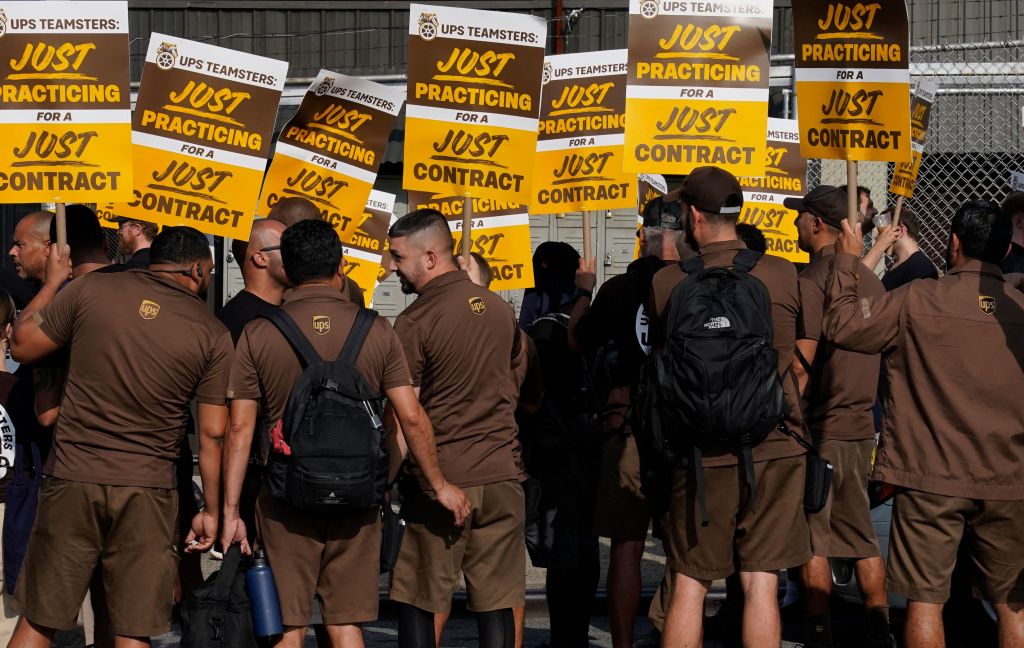After 50 days of striking to demand a fair contract, over 100 unionized HarperCollins workers took their picket line over to the New York headquarters of News Corporation, the publishing giant’s parent company.
But the rally in Manhattan on Wednesday doesn’t seem to have generated the progress union leaders were hoping for.
Videos by VICE
“Union busting is part of their game,” Olga Brudastova, president of the United Auto Workers (UAW) Local 2110, told Motherboard before the rally on Wednesday. “We’ve been bargaining for over a year at this point, and I guess it’s on brand for [HarperCollins] to continue with this stance.”
HarperCollins Union members have been bargaining for what they consider a fair union contract since December 2021. This whole time, union leadership have been asking for a $5,000 increase to starting salaries, basic union security rights, and for the company to codify its commitment to diversity, equity, and inclusion (DEI) initiatives.
HarperCollins is the second largest trade publisher in the U.S. and the only one of the Big Five trade publishers with an organized union. Over the past two years, HarperCollins and other major book publishing companies have reported record breaking profits. Union members say that HarperCollins employee salaries amount to only $55,000 per year on average. A starting salary for a full time employee at HarperCollins can look more like $45,000.

“HarperCollins has negotiated in good faith for more than a year with the United Auto Workers Union and already agreed to numerous proposals that the UAW sought to include in a new contract,” a HarperCollins spokesperson said in a statement to Motherboard. “Unfortunately, union leadership continues to push far-reaching demands rather than working together to come to a fair and reasonable agreement for both sides. The door remains open for the union to come back to the table.”
When the union’s previous contract expired in April, union workers staged a one-day strike on July 20. On November 10, 2022, union workers went on strike indefinitely, leaving the major book publishing company with sizable gaps across departments like editorial, sales, publicity, design, legal, and others.
“[HarperCollins is] trying to just make the union go away, and that’s really the only thing they’re concerned about,” Brudastova said. “They don’t seem to be concerned about the quality of work, or the schedules and how deadlines are moved or not respected these days, because of the strikes. They’re not concerned about the reputation. They’re not concerned about creativity. Because if they were, they would be listening to their own authors who repeatedly stand in solidarity with us.”
It’s now the 51st day of the strike, meaning that HarperCollins union workers have not been paid since November. As a result, many workers may be forced to look for new jobs in order to continue living in one of the most expensive cities in the country. Meanwhile, workers have criticized the publishing company for signing book deals made with far-right politicians like Florida Governor Ron DeSantis, who was instrumental in recent efforts to ban LGBTQ-themed books in schools and libraries nationwide.
In an online interview with Motherboard, the team behind @xoxopublishinggg, an Instagram meme account loosely inspired by the TV show Gossip Girl and acting as an anonymous tip line for the publishing industry, said HarperCollins’ unwillingness to meet the demands of the union workers hurts the entire industry.
“The industry already likes to make everyone at a certain level feel replaceable, but this is a whole new level—and an ignorant, short-sighted one,” the account’s admins told Motherboard, using the name Kate Keller in an obvious nod to the show’s HBO Max reboot. “First off, the [publishers] just need to raise salaries—35k-45k in this economy? Please… It’s an individual choice to stay in the industry, and a lot of us make it, but as the rate of inflation and cost of living continues rising, it’s harder and harder to advocate taking a job in a business whose salaries and practices are stuck in the ’80s.”
Brudastova says that the union workers want more than anything to be back to work, but that it’s getting harder with the financial burdens, cold weather, and emotional toll that striking has taken on workers—especially those that have to take second jobs to support themselves.
“They miss their work, they miss working on books, they miss the people they’ve worked with. they are dedicated to this work,” she said. “And that’s why it’s so easy to exploit people who choose labor of love, so to speak, because they truly care.”




